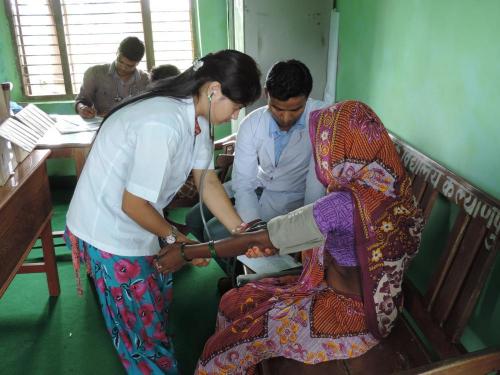
Thanks to the Nepal Red Cross Society, Phul Kumari Mahato Memorial Hospital (PKMMH) will soon establish a blood bank. However, recently we had a case in which a woman had given birth, was bleeding excessively and needed B+ blood. We put out a call to the community and a number of policeman from Bandipur came to PKMMH and donated blood. This group then went on to the Red Cross in Lahan for cross matching.
As a reaction to the recent flooding throughout the country, including Siraha, we brought a medical team to a school in Kalyanpur to conduct a health camp; seeing 55 people, providing medication, including providing saline drip for two people who were very dehydrated. The team was very creative in setting up a small clinic with the saline drip administered in one of the classrooms, while the patients laid on desks.
Many of the people at the camp should have seen a doctor a long time ago; however services may not have been available, they didn’t want to spend the money thinking services might be expensive or they just didn’t understand the need for medical care waiting only until the situation became an emergency. Herein lies a huge health issue for people living in rural areas, i.e. there is an awareness gap regarding preventative medical care, as well as, a dearth of medical staff throughout various communities.
On the road to the camp I noticed a number of people openly defecating and others washing their buffaloes in murky water. Recently, I’ve noticed many people with skin problems due to poor hygiene, lack of clean water and improper washing. People seem to use home remedies; as a last resort coming to see a medical professional
What I’m learning is that a Hospital/Health Post/Medical Professionals must “live” in the community that is being served, partnering with locals. Providing true community health services, must include “barefoot” services, i.e. walking around, attending haat bazaars and being part of the local village and not just waiting for people to come into an institution. People don’t seem to really understand why medical professionals are needed except during an emergency, when someone becomes sick due to previous lack of preventative or basic health care. People just aren’t used to seeing a doctor/dentist.
The question for me becomes one of how we bridge the health care knowledge gap. This isn’t necessarily about providing free, once in a while medical/dental camps, in which follow-up, doesn’t necessarily occur. Transportation also becomes an issue if a medical institution is some distance from where the camp is conducted thereby preventing follow-up.
I would posit that the most effective method for providing community health services is for VDC officials, school heads, community club members, Health Post officials, medical institution staff, community leaders and others to collaborate to design and implement effective health care programs. This has to involve coming out of institutions and being in the community where locals can witness what providing health services means. We all know how people like to watch; what better way to help people understand what medical professionals do than to provide services at a busy haat bazaar where there is a “captive audience”.
But there is also a gap on the part of the medical profession and how we provide community services. People should get used to coming to institutions for their health services but how about the majority of people who might be afraid or just not be aware, only because they have never been to a doctor/dentist. This fear/lack of awareness, which I’ve witnessed, also gets translated to people’s children. The question is how do we break this?
Being in the community, in a village square, providing services in the open, walking around a village with a stethoscope and blood pressure gauge and going into people’s homes are modalities that have been traditionally used. This is something which the medical professional in rural areas can learn from and take to heart in providing comprehensive, community medical services.










Add new comment